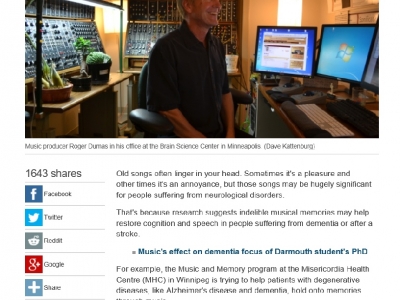Music and Memory
16 Feb. 2016
Posted by Danny Tryon

Link between lyrics and long-term memory still being deciphered
By David Kattenburg, for CBC News Posted: Feb 11, 20161:27 PM ET I Last Updated: Feb 11, 20161:27 PM ET
Music producer Roger Dumas in his office at the Brain Science Center in Minneapolis. (Dave Kattenburg)
Old songs often linger in your head. Sometimes it's a pleasure and other times it's an annoyance, but those songs may be hugely significant
for people suffering from neurological disorders.
They help to restore cognition and speech in people suffering from dementia or after a stroke.
• Music's effect on dementia focus of Darmouth student's PhD
For example, the Music and Memory program at the Misericordia Health Centre (MHC) in Winnipeg is trying to help patients with degenerative
diseases, like Alzheimer's disease and dementia, hold onto memories through music.
Natalie Baird is a recreation facilitator at MHC, who helps patients remember and speak by getting them to sing.
She brings them iPods filled with their favourite songs on a weekly basis.
"Often what happens is when I go in and see people, they're very
disengaged After listening to a few songs, they really start to come back...
David Kattenburg Known to students as "Dr. Dave," David Kattenburg has a PhD in Health Sciences from McMaster University, and teaches
microbiology, anatomy and physiology. He's created global environment, development, social justice and science stories for CBC Radio,OW Radio and others.
David is also the publisher and editor of greenplanetmonitor.net. Related Stories
• Program seeks
donations to bring
music to seniors'
ears
• Researchers
pinpoint circuits that
drive PTSD
flashbacks
• Insomnia's effects
on brain explored
External Links
• Music and Memory
program
• Roger Dumas at the
Brain Sciences
Center (Note: CBC does not
endorse and is not responsible for the content of external links.)
to life, I'd say, and come out of their shells," Baird said.
The patients' families appreciate the results, said MHC recreation manager Ellen Locke.
"We have a good, I would say 10 or 15-minute reminiscence session after the music, which is huge. It sort of brings that person back to the family,"
she said.
Music spurs memories ...When Baird and Locke go to visit with an MHC resident, it's obvious 89-year-old patient Elsie will need some prodding to participate.
"You feel like listening to some music?"
Locke asks.
"Not really," Elsie replies...after a short silence. Elsie is awake, but stant. But a cheap pair of headphones and a few old tunes seem to help her perk
up.
Ellen Locke and Natalie Baird work with tne Music and Memory program at Misericordia Health Centre. (Dave
Katten burg)
Baird picks a song from her iPod, Tennessee Waltz by Patti Page, which gets Elsie's nod of approval.
As Baird slips the headphones over Elsie's head, the older woman's eyes start to light up. She sings along with Page, and then without her.
"You were singing the lyrics when the lyrics weren't playing!" Baird says to Elsie. "And you knew all the lyrics. That's pretty amazing."
"I like my music," Elsie replies before asking to hear another song ..Baird plays Apple Blossom Time by the Andrew Sisters and Elsie sings
along, monotone and hoarse at first, then louder and more expressive. How it is that brains shed memory, while retaining lyrics and music, is one
of neuroscience's great mysteries. Making brains sing south of the border ..At another hospital in Minneapolis, Minn., Roger Dumas is investigating
the secrets of music circuits in the brain, and how rugged melodic pathways may help restore others that have been lost. Besides being a music producer - whose office is lined with gold and platinum records he's helped produce for artists like Janet Jackson and
Prince - he's also a research associate at Minneapolis' Brain Sciences Center. Dumas uses Moog synthesizers to play bit of music to volunteers wearing
sensor-packed helmets, which detect magnetic waves sailing across the surface of their brains.
In a sense, he's tickling brain circuits to get them to sing back. And the payoffs may be huge for people suffering from Alzheimer's or dementia.
"If we can figure out how to extract a melody from the brain, we could help people who are locked-in to communicate," he said.
His Moog-brain interface is more than just a high-tech parlor trick. It reveals the brain's astonishing ability to process and retain music; to do
complex things like predict next notes, or capture melodic contour. Neural circuits like these may help restore speech and cognition circuits
that have been downed by stroke or dementia. Can hardy music circuits jog cognition and speech? Hopes are high. And it
seems clear that singing old songs makes people like Elsie happy ..And that's good for their health.
I


Post new comment